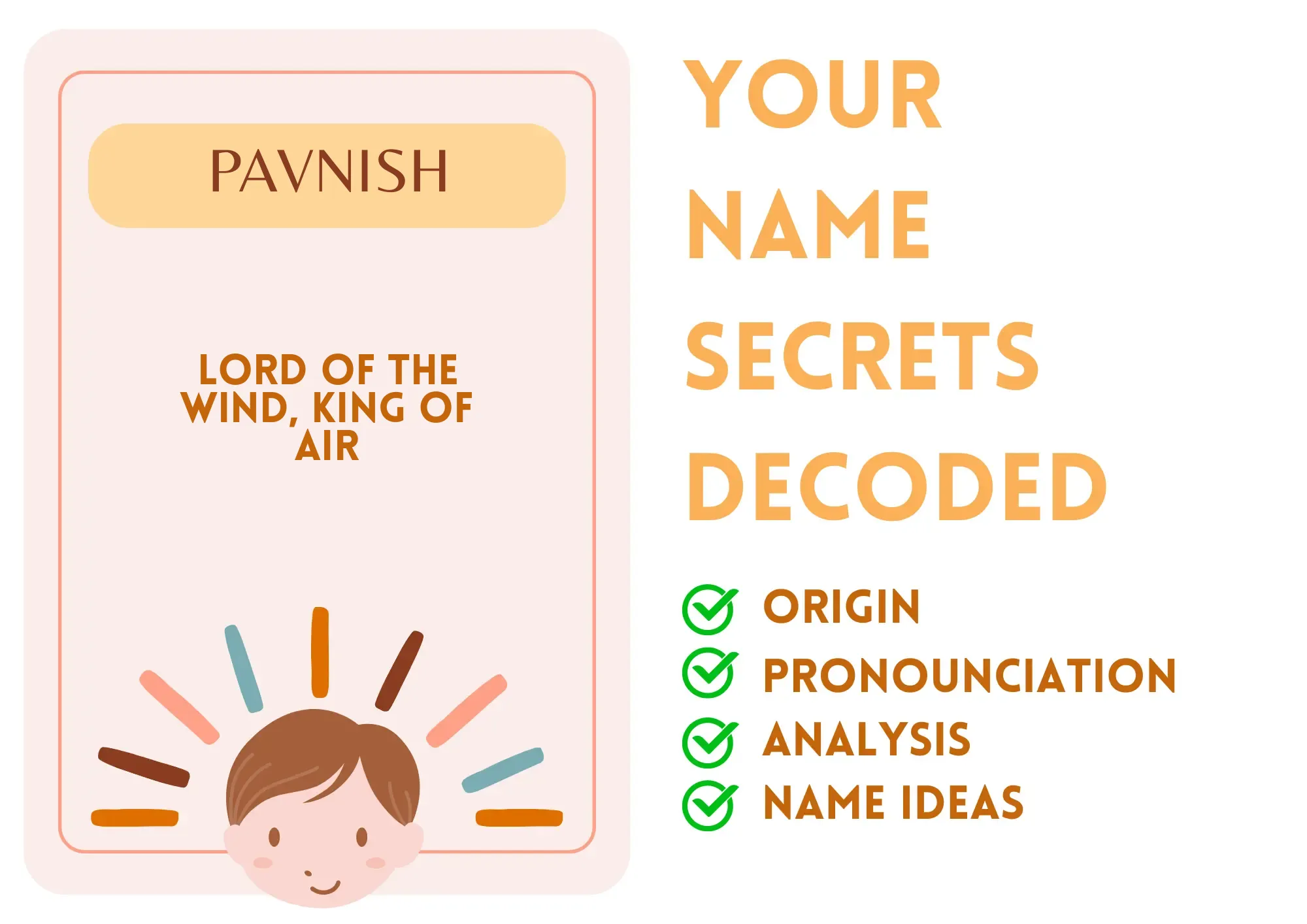
Pavnish
Pavnish is a unique name of Indian origin, meaning 'Lord of the Wind' or 'King of the Air,' derived from the Sanskrit root 'Pavan' which translates to 'breeze' or 'air.' Commonly used within Indian communities, it is predominantly a masculine name, though it may be seen as unisex in some contexts.
In Hinduism, this name resonates with spiritual significance, reflecting the elements of nature and is often associated with deities that control air and space. Pavnish represents freedom, movement, and the ethereal qualities of the wind, making it a poetic and serene choice.
Overall, Pavnish is a name that invokes feelings of lightness and grace, conveying an aura of spirituality. It is easy to pronounce and write, though its uniqueness makes it less common. Nicknames such as Pav or Nish are quite manageable.
Basic Information
Gender: Boy
Sounds Like: pav-NEESH
Pronunciation Explanation: The name begins with a soft 'pav' like 'pavement' and flows into 'neesh' with a long 'ee' sound, making it a smooth, two-syllable name.
Summary and Meaning
Meaning: Lord of the Wind, King of Air
Origin: Pavnish has Indian roots, deeply embedded in Sanskrit language and Hindu tradition.
Usage: Pavnish is traditionally considered a masculine name, symbolizing strength and nobility associated with the wind.
Name Number (Chaldean)
Name Number (Pythagorean)
Name Constellation (Nakshatra)
Name Zodiac Sign (Rashi)
Popularity (Global Rank)
Overall: 190173
Boys: 54235
Most Popular in
Religious and Cultural Significance
Religion: Hindu
Background: In Hindu culture, Pavnish embodies elements of nature, particularly air, and is often linked to characters and deities associated with creation and movement.
Cultural Significance: The name is appreciated for its spiritual connotations related to freedom, nature, and divinity, often favored among parents who value the elements of nature.
Historical Significance: As a name that reflects natural elements, Pavnish ties back to ancient Indian texts that depict the significance of air and wind within the universe and their protective and nurturing qualities.
Popular Culture
Literature and Mythology: The name Pavnish might not be widely recognized in classical literature; however, names like Pavan appear in various mythological narratives as embodiments of wind.
Movies and Television: Though not common in popular films, variations of the name or similar names are sometimes used for characters represented as free-spirited or ethereal.
Feelings and Perceptions
Perception: Pavnish is generally perceived positively, evoking feelings of freedom, grace, and spirituality.
Positive Feelings: Fresh, uplifting, serene, unique, and spiritual.
Negative Feelings: Some may find it unfamiliar, and its pronunciation might deter individuals unfamiliar with Indian names.
Practical Considerations
Ease of Writing and Calling: Pavnish is relatively straightforward to write, consisting of seven letters and two syllables, making it memorable and easy to pronounce.
Common Typos and Misspellings: Pavinsh,Pavanish,Pavnishh,Pavnis
Common Nicknames: Pav,Nish,Pavni
Pavnish Popularity
Pavnish Usage and Popularity By Country
| Country | Rank (Overall) |
|---|---|
| New Zealand | 33723 |
| India | 38021 |
| Germany | 81441 |
Pavnish Usage and Popularity By City
| City | Rank (Overall) |
|---|---|
| Delhi | 10532 |
| Chandigarh | 5597 |
| Saharanpur | 1240 |
| Gorakhpur | 1823 |
Compatibility Analysis
Famous Persons Named Pavnish
No results found for Pavnish.
Related Names
Similar Sounding Names:
Pavan,Vanish,Navin,Nishit